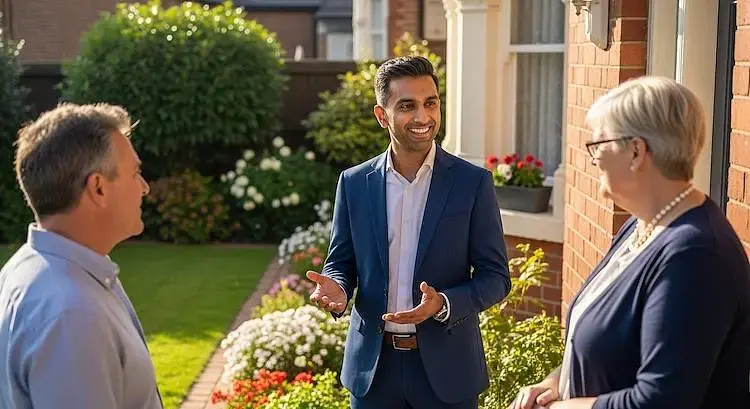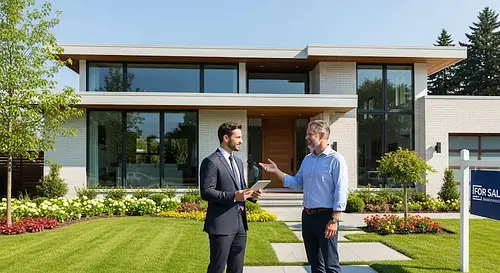How To Door Knock As A Realtor
Learn how to door knock as a realtor with confidence using proven scripts, smart targeting strategies, and follow-up techniques that actually convert. This step-by-step guide will help you master real estate door knocking and turn every conversation into an opportunity.

Written by Seth Cox
Jul 14, 2025 / Real estate lead generation
In this comprehensive guide, you’ll learn exactly how to door knock as a realtor—from choosing the right neighborhoods to crafting scripts that open doors (literally). We’ll also cover the best times to go, what materials to bring, how to follow up effectively, and how to stay safe while prospecting. If you're ready to grow your real estate business the personal way, this article is your blueprint.

Section 1: Planning and Preparation
Set Clear Goals for Each Door Knocking Session
-
Collect contact info
A quick conversation and a name, phone number, or email is a win. These small connections often turn into big opportunities down the line. -
Book appointments
Whether it’s a listing consultation or a coffee chat with a potential buyer, getting something on the calendar is a great outcome. -
Build your local brand
Even if someone isn’t thinking about real estate right now, a friendly face and a helpful attitude can make you the agent they call when the time comes. -
Promote a listing or open house
Use your time to spread the word about a new listing, upcoming open house, or recent sale that could pique neighborhood interest. -
Spot potential sellers
Listen for signs that someone might be preparing to move—empty nesters, recent renovations, or even a casual “We’ve been thinking about it.”
Choose the Best Neighborhood To Door Knock
-
Prioritize high-turnover areas
Look for neighborhoods where homes sell frequently. These areas typically have more homeowners open to selling, which means more potential leads for you. -
Focus on recent activity
If a home just sold nearby, the neighbors are already thinking about real estate. Use that momentum to spark conversations and position yourself as the local expert. -
Watch for signs of life changes
Homes with overgrown lawns, moving boxes, or aging exterior features can indicate upcoming transitions—retirement, downsizing, or job relocations. -
Check ownership trends
Owner-occupied homes tend to be more responsive to door knocking than rentals. A quick check on public records or property data tools can help you filter your list. -
Be aware of “No Soliciting” signs and HOA rules
Always respect posted signs and neighborhood guidelines. In some areas, door knocking may be prohibited or require permission—so do your homework ahead of time.
Research Properties Before You Knock
-
Check the home’s sales history
Look up when the home was last sold, what it sold for, and how long the current owners have lived there. Long-time owners may be closer to making a move. -
Review listing photos or satellite images
If the home has been on the market before, past photos might reveal dated interiors or signs of deferred maintenance—great opportunities to talk about value and upgrades. -
Identify FSBO, expired, or withdrawn listings
These homeowners have already shown an interest in selling. With the right approach, you might be the fresh start they need. -
Look for absentee owners or rentals
Investment properties and second homes often have motivated sellers—especially if the home shows signs of neglect or vacancy. -
Gather context through public records or social media
If available, check for life events like growing families, career changes, or relocations. Just be sure to use this info respectfully—it’s about understanding, not intruding.
Best Time To Door Knock Real Estate
Related: The Best Times To Host An Open House In Real Estate
-
Weekday afternoons (4:00 PM – 6:30 PM)
Many homeowners are home from work but haven’t started dinner yet. It’s a great window for relaxed, low-pressure conversations. -
Saturday mornings (10:00 AM – 2:00 PM)
This is often the sweet spot. People are up and about, running errands or working in the yard, and generally more open to a quick chat. -
Avoid dinner hours and early mornings
Don’t knock during meals, before 9 AM, or after 7 PM. You’ll likely annoy more people than you help—and that can damage your reputation. -
Adapt to your local area
In a neighborhood full of retirees, midday might work well. In a commuter-heavy suburb, evenings or weekends are more effective. -
Be consistent
Whether you door knock weekly or monthly, sticking to a schedule helps you build familiarity. Homeowners will start to recognize you—and that builds trust over time.
Real Estate Door Knocking Scripts
Key Elements of a Strong Door Knocking Script
-
Friendly introduction
“Hi, I’m [Your Name] with [Your Brokerage]. I work with a lot of buyers and sellers here in the neighborhood.” -
Clear value hook
“I just helped a home nearby sell with multiple offers, and I have buyers looking for something similar.” -
Permission-based language
“Would it be alright if I left you with a quick market update?” -
Simple, engaging question
“Have you thought about making a move sometime in the next year?” or “Do you know anyone in the neighborhood who might be thinking about selling?” -
Easy exit or follow-up
“If now’s not the right time, no problem at all—I just wanted to introduce myself in case you ever need a local resource.”
Deep Dive: Real Estate Door Knocking Scripts: Tips & Templates That Open Doors
Scripts for Common Door Knocking Scenarios
-
General neighborhood introduction
Introduce yourself as the go-to local expert and leave behind your contact info. -
Just listed / just sold
Let neighbors know about recent activity and build urgency by mentioning buyer demand. -
Buyer need
“I’m working with a couple looking for a home in this area. Do you happen to know anyone who’s been thinking of selling?” -
Open house invitation
Use the opportunity to invite neighbors personally and build visibility for your listing. -
Expired or FSBO listings
Approach with empathy. “I know selling a home can be frustrating—if you’re still considering it, I’d be happy to offer a fresh perspective.” -
Absentee owners
Tailor your message to rental property owners or second-home owners who may be open to offloading their investment. -
Community connection
Mention local events or market trends to show you’re not just selling—you’re part of the community.
What to Bring for a Successful Door Knocking Session
-
Business cards
Always have these on hand. They're simple, expected, and easy for homeowners to keep or pass along. -
Just listed / just sold postcards
These create instant credibility and show you’re actively working in the neighborhood. -
Local market report flyers
Include recent sales, market stats, or a quick “What’s your home worth?” blurb to spark curiosity. -
Buyer need / property wish list flyers
Great for low-inventory markets—showcase active buyers who are ready to move, and ask if they know someone selling. -
Door hangers
Perfect for homes where no one answers. Keep the message short and the design eye-catching. -
“Sorry I missed you” notes
A handwritten sticky note or small pre-printed message adds a personal touch and shows you made the effort. -
Pop-by gifts (optional)
If it fits your brand, bring a small branded gift like a notepad, seed packet, or home tip sheet—something useful and memorable.
What Realtors Wear When Door Knocking
You might also like: What To Wear To An Open House
-
Dress professionally but casually
A blazer and jeans or a clean polo with slacks strikes the right balance. You’re not going to a listing appointment, but you do want to be taken seriously. -
Wear comfortable shoes
You’ll be walking a lot, often on uneven sidewalks or driveways. Choose shoes that look nice but won’t leave you with blisters. -
Prepare for the weather
Sunscreen, layers, a hat, or even a branded umbrella—showing up comfortable helps you stay confident. -
Avoid sunglasses at the door
Eye contact builds trust. If you’re wearing sunglasses, take them off before someone opens the door. -
Keep hands free
Use a shoulder bag or crossbody so you’re not fumbling with materials. Homeowners feel more at ease when they can see your hands clearly.

Section 2: How to Door Knock Effectively As A Realtor
Make a Positive First Impression
-
Smile and stand a respectful distance from the door
Position yourself about 3–4 feet back so you’re close enough to hear, but not crowding the entry. A friendly smile helps set the tone before you even speak. -
Keep your hands visible—no sunglasses or hands in pockets
Homeowners feel more at ease when they can see your hands. Avoid wearing sunglasses during the interaction—they block eye contact and can feel impersonal. -
Use your script to introduce yourself clearly and confidently
You don’t need a rehearsed pitch, just a simple, upbeat intro: “Hi, I’m [Your Name] with [Your Brokerage]. I work with a lot of buyers and sellers in the area, and I just wanted to introduce myself.”
Have Genuine Conversations At The Door
-
Ask open-ended questions
Instead of “Are you thinking of selling?” try “How long have you lived here?” or “Have you seen what homes are selling for lately?” These invite conversation without pressure. -
Listen more than you talk
You’re there to understand, not overwhelm. Let the homeowner lead the direction of the conversation and respond based on what matters to them. -
Adapt your message on the fly
If they mention they just refinanced, just moved in, or aren’t thinking about selling, acknowledge that and pivot. You’re planting seeds, not closing deals. -
Stay curious and conversational
Treat each interaction like a neighborly check-in, not a transaction. Your tone and attitude should say, “I’m here to help,” not “I need something from you.”
Offer Value and Solutions When Door Knocking
-
Share local market insights
Mention recent sales, price trends, or shifts in demand: “Three homes sold in this neighborhood in the last 60 days—buyers are definitely active right now.” -
Offer a free home valuation
Most people are curious about what their home is worth. Let them know you’re happy to send a quick, no-obligation estimate. -
Highlight buyer demand
If you're working with buyers looking in that area, say so: “I have clients specifically searching for a 3-bed home in this neighborhood—have you heard of anyone thinking about selling?” -
Talk about local development or changes
Mention upcoming zoning changes, school improvements, or nearby construction projects that could affect home values. -
Position yourself as a local expert
Instead of pushing your services, focus on being a helpful resource: “If you ever need a contractor referral or just have a question about the market, I’m happy to help.”
How to Handle Objections When Door Knocking
-
Acknowledge the objection without pushing back
Don’t argue or try to change their mind on the spot. Respond with calm understanding: “Totally understand—you probably get a lot of people coming by.” -
Use empathy-driven phrases
“I get it—selling a home is a big decision,” or “Sounds like now’s not the right time. I appreciate you letting me know.” -
Identify the root concern
Sometimes people say “not interested” because they’re busy, overwhelmed, or just unsure. If it feels appropriate, ask: “Can I follow up another time when it’s more convenient?” -
Pivot or offer a light next step
If the conversation ends, offer something small and helpful: “Here’s a quick market update if you ever get curious. Happy to be a resource.” -
Thank them and move on gracefully
A polite, professional exit keeps the door open for future contact—literally and figuratively.
Know When to Move To The Next Door
-
Read body language and tone
If the homeowner steps back, crosses their arms, or gives short answers, they’re likely ready for the conversation to end. Respect that. -
Don’t force it
Trying to win them over with more information rarely works. If the energy shifts, thank them for their time and offer a polite exit: “Thanks so much—I’ll leave this with you in case you ever need anything.” -
Leave your materials behind
Even if they didn’t seem interested, your flyer or postcard might sit on their counter and get revisited later—especially if it includes helpful market data or a recent sale. -
Respect closed doors
If no one answers after a knock and a short wait, don’t knock again or peek through windows. Leave a “Sorry I missed you” note and move on. -
Keep your mindset positive
Not every door has to lead to a conversation. Even a quick hello or a simple drop-off helps build brand familiarity in your farm area.
Real Estate Door Knocking Safety Tips
-
Share your location with someone you trust
Let a colleague, friend, or team member know your route and schedule. Apps like Life360 or Find My iPhone can help you stay connected in real time. -
Trust your instincts
If something feels off—whether it’s the home, the person, or the situation—walk away. You’re never obligated to stay in a conversation that makes you uncomfortable. -
Stay outside the home
Even if someone invites you in, it’s best to keep the interaction on the porch. You’re not there for a showing—you’re there for a quick introduction. -
Avoid remote or poorly lit areas
Stick to well-populated neighborhoods during daylight hours. If you wouldn’t feel safe walking there at night, don’t door knock there during the day. -
Keep your hands free and your phone accessible
Use a crossbody bag or backpack so you can carry materials without juggling too much. Have your phone charged and easy to grab if needed.

Section 3: Follow-Up and Lead Conversion
Track and Organize Your Real Estate Leads
-
Log every visit in your CRM or spreadsheet
Include the address, homeowner name (if known), time of visit, and outcome—whether they answered, what you discussed, and any next steps. -
Tag leads by category or interest level
Use labels like “Hot,” “Warm,” or “Cold,” or group contacts by follow-up timeframe (e.g., “Follow up in 3 months”). -
Take quick notes after each conversation
Jot down personal details they shared—kids, renovations, future plans—so your next interaction feels more personalized and less like a cold outreach. -
Track no-answer homes too
Even if no one was home, record the visit and note that you left a flyer or door hanger. It sets you up for smarter re-visits in the future. -
Use a mobile CRM app if possible
Apps like Follow Up Boss, Wise Agent, or even Google Sheets on your phone make it easy to update your lead log in real time as you walk.
Create a Consistent Follow-Up Plan
-
Follow up within 24 hours
Send a quick text, email, or handwritten note while the conversation is still fresh. A short “Nice meeting you!” message keeps the connection alive. -
Use multiple channels
Don’t rely on just one method. Combine phone calls, emails, texts, mailers, and social media touches over time to stay visible without overdoing it. -
Provide value with every touch
Don’t just “check in.” Send something helpful—a market update, buyer demand report, home maintenance tip, or neighborhood news. -
Set calendar reminders or use CRM automation
Keep follow-ups from slipping through the cracks by scheduling them in advance. Many CRMs let you set automated drip campaigns based on lead type or timeline. -
Be patient but persistent
Most homeowners aren’t ready to move after one conversation—but if you stay in their orbit with consistent, helpful outreach, you’ll be their first call when they are.
Nurture Door Knocking Leads Over Time
-
Check in quarterly (or seasonally)
Every few months, reach out with a quick update, note, or call. Tie it to something relevant—market changes, new listings, or a neighborhood event. -
Celebrate milestones
If a homeowner mentioned a birthday, anniversary, retirement, or renovation, make a note and follow up when the time comes. It shows you’re listening. -
Share useful info, not just real estate pitches
Send occasional emails or postcards with homeowner tips, local market trends, or community news to provide value without selling. -
Stay consistent—even if there’s no reply
Many people won’t respond right away. That doesn’t mean they’re not paying attention. Keep showing up with value. -
Be the local expert they come to trust
The agent who nurtures leads without pressure becomes the one people want to call when they’re ready to take action.
Use Open Houses to Reinforce Your Door Knocking Strategy
-
Personally invite neighbors before the event
Door knock a few days in advance with a friendly, non-salesy invite. Let them know it’s a chance to check out the home and see what properties are selling for in their area. -
Use the open house as a second touch
If you’ve already met them at the door, the open house gives you a reason to follow up again and deepen the relationship. -
Create signage and handouts that reinforce your brand
Make sure your name, contact info, and a value-driven message (like buyer needs or recent sales) are visible and consistent. -
Capture contact information from attendees
Use a sign-in sheet or a digital open house sign-in tool like Showable to collect names and emails for future follow-up. -
Mention buyer interest to create urgency
If you meet neighbors who might consider selling, let them know you’re actively working with buyers—and their home might be next.
Reflect and Improve Your Door Knocking Strategy
-
Review each session after you finish
What kinds of responses did you get? Were certain scripts more effective? Did people seem rushed, annoyed, or engaged? -
Pay attention to patterns
Start tracking when and where you get the best results. Are Saturdays more productive than weekdays? Are certain streets more welcoming? -
Watch for body language cues
Not every homeowner will tell you how they feel—but their posture, tone, and pacing give you valuable feedback. -
Update your scripts and materials
If something feels awkward or ineffective, tweak it. Sometimes even a small shift in phrasing can change the outcome. -
Celebrate the wins
Did someone invite you to follow up? Mention a life change? Smile and thank you for stopping by? These are signs you’re doing it right—track them and build on that momentum.

Frequently Asked Questions About Real Estate Door Knocking
Does door knocking work in real estate?
Is real estate door knocking considered soliciting?
What is the best time to door knock for real estate?
- Weekdays from 4:00 PM to 6:30 PM, when homeowners are back from work but haven’t started dinner yet.
- Saturday mornings from 10:00 AM to 2:00 PM, when people are typically home and more relaxed.






